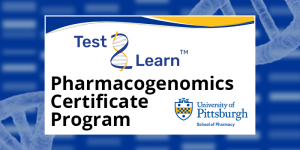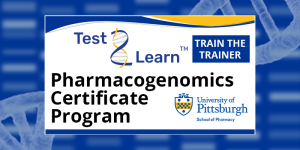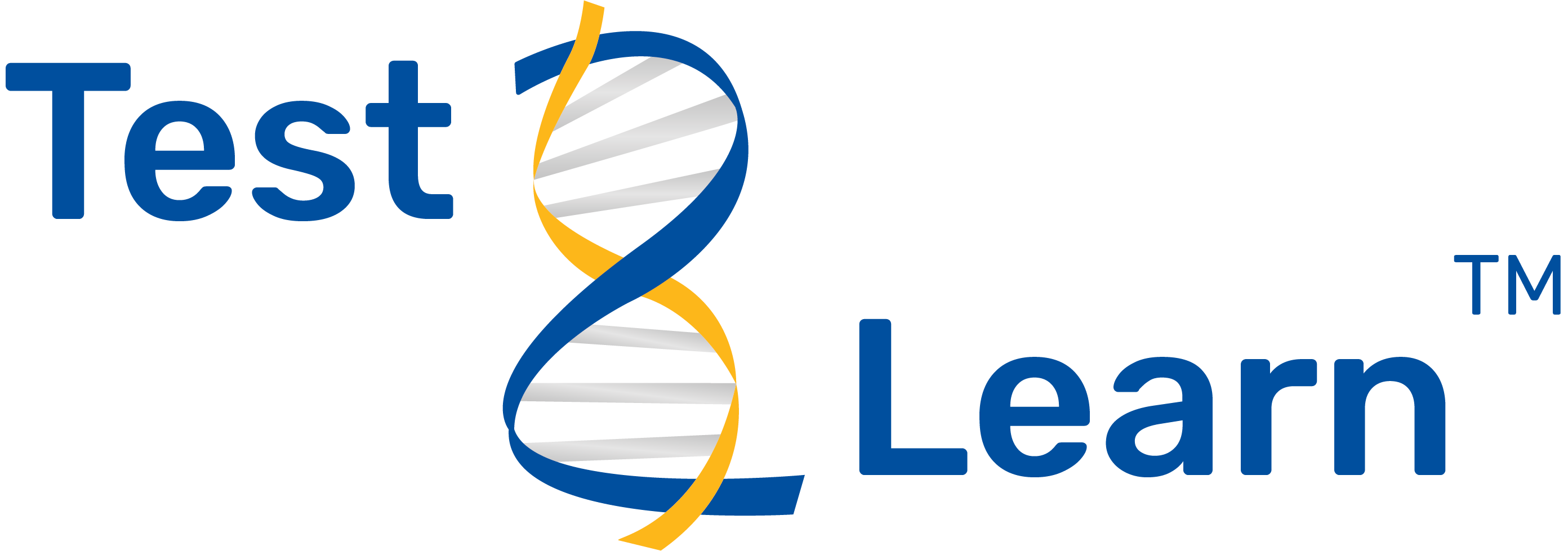Coming October 11th! – Test2Learn™ Pharmacogenomics Certificate Program & Train-the-Trainer Workshop
Join us on Tuesday, October 11th, 2022 for our Test2Learn™ Pharmacogenomics Certificate Program followed by a Train-the-Trainer Workshop.
Please note: The Train-the-Trainer workshop is open to those who have successfully completed the certificate program. If you have previously completed the certificate program and would like to attend the Train-the-Trainer workshop, please contact test2Learn@pitt.edu for information on how to register.
Certificate Program Features
- 20 credit hours of ACPE/CME continuing education (pharmacists & physicians)
- Unique dual home study and live training via Zoom
- Optional personal genomic testing kit and processing
|
 |
Train-the-Trainer Workshop Features
- Exclusive training with course developers required to train others
- Guided tutorial of the innovative Test2Learn™ platform
- Stepwise toolkit for hosting a training as a registered provider
|
 |
Schedule of Live Educational Activities on Tuesday October 11th, 2022.
| 7:45 am |
Program Registration |
| 8:00 am – 12:00 pm |
Certificate Training Program Morning Session |
| 12:00 pm |
Break for lunch |
| 1:00 pm – 4:30 pm |
Certificate Training Program Afternoon Session |
| 5:00 pm – 7:30 pm |
Train-the-Trainer Program |
Activity Fees (registration deadline is October 4th)
$400 – Pharmacogenomics Certificate program
- Add the Train-the-Trainer Workshop for only $100 (regular cost $250)
- Add optional personal genomic testing for $99+shipping
|
Faculty Members
 |
Philip E. Empey, PharmD, PhD, FCCP
Associate Director, Institute of Precision Medicine;
Associate Professor, Pharmacy and Therapeutics,
University of Pittsburgh School of Pharmacy
Faculty profile |
 |
James Coons, PharmD, FCCP, FACC, BCCP
PGY2 Cardiology residency Program Director,
Professor, Pharmacy and Therapeutics,
School of Pharmacy, University of Pittsburgh
Faculty profile |
 |
Lucas Berenbrok, PharmD, MS, BCACP, TTS
Associate Professor, Pharmacy and Therapeutics
School of Pharmacy, University of Pittsburgh
Faculty profile |
|
|
Certificate Program Activity Description
The 20-hour certificate program enables students to learn by using real genetic data in highly-interactive exercises with an optional activity for learners to undergo personal genomic testing. The Certificate Program is comprised of:
- 12 hours of self (home) study
- 8 hours of live training
The target audience for the certificate program is pharmacists and physicians including students, academia, and association staff. Others are welcomed to attend.
Successful completion of the self-study component involves passing the self-study assessment quizzes with a grade of 80 percent or higher. Attendance and participation in the live session is required. Successful completion of both is needed to received the certificate and continuing education credit. Partial credit will not be awarded. |
Certificate Program Learning Modules
Home Study (self-paced)
- Advances in Precision Medicine and Pharmacogenomics
- The Pharmacist in Pharmacogenomics
- A Review of Genetics and Nomenclature
- Introduction to Medical Genetics
- Principles of Genetic and Genomic Testing
- Regulation and Reimbursement of Genetic and Genomic Testing
- Ethical Issues Associated with Genomic & PGx Testing
- Social Justice Issues Associated with Genomic & PGx Testing
- Consent and Communication of Genetic Test Results
- Pharmacogenetics Scientific Evidence to Clinical Guidelines
- Cardiovascular Pharmacogenomics
- Psychiatric and Neurologic Pharmacogenomics
- Pharmacogenomics in Internal Medicine
- Pain Pharmacogenomics
- Hypersensitivity and Skin Reactions
- Oncology Pharmacogenomics
- Leading innovators – success stories: Identifying Opportunities and Implementing Pharmacogenomics (PGx) into Community Pharmacy Practice
- Leading innovators – success stories: A Pharmacogenomics-MTM model in Community pharmacy
|
Live Program (faulty-led)
- Population variability and PGx clinical decision making
- Leveraging PGx information resources
- Predicting PGx phenotypes using real genetic data
- Application to patient cases
- Communicating with patients and providers
- PGx implementation barriers
- Implementation models and transitions of care
|
Learning Objectives
The pharmacist who completes the home-study and live components of this Pharmacogenomics Certificate Program should be able to:
- Demonstrate understanding of basic genetic/genomic concepts and nomenclature
- Describe advances in scientific knowledge and technology, which have led to innovations in personalized medicine
- Identify the role of behavioral, social and environmental factors (lifestyle, socioeconomic factors, pollutants, among others) to modify or influence genetics in the manifestation of disease.
- Compare and contrast different PGx study designs.
- Identify drug- and disease-associated genetic variations that facilitate development of prevention and treatment strategies and appreciate there are differences in testing methodologies and are aware of the need to explore these differences in drug literature evaluation
- Assess predisposition to disease and selection of drug treatment by using family history
- Describe the role of genetic factors in maintaining health and preventing disease
- Assess the difference between clinical diagnosis of disease and identification of genetic predisposition to disease (genetic variation is not strictly correlated with disease manifestation)
- Recognize that pharmacogenomic testing may also reveal certain genetic disease predispositions (e.g., the Apo E4 polymorphism)
- Demonstrate an understanding of how genetic variation in a large number of proteins influences pharmacokinetics and pharmacodynamics related to pharmacologic effect and drug response
- Use online resources to assign haplotypes and predicted drug response phenotypes from genetic data.
- Describe the influence (or lack thereof) of ethnicity in genetic polymorphisms and associations of polymorphisms with drug response
- Recognize the availability of evidence-based guidelines that synthesize information relevant to genomic/pharmacogenomic tests and selection of drug therapy (e.g. Clinical pharmacogenomics implementation consortium)
- Evaluate the availability of genetic testing under FDA, CLIA, and DTC regulations.
- Evaluate PGx test reports through group-based activities and role-playing to demonstrate the PGx knowledge/skill-based competencies
- Create a step-wise decision-making process for the integration of PGx with clinical variables known to impact PK/PD to make appropriate PGx-based recommendations for patients and populations.
- List drugs/clinical situations where PGx testing is likely to be most useful clinically
- Identify the potential physical and/or psychosocial benefits, limitations and risk of genomic/pharmacogenomic information for individuals, family members and communities, especially with genomic/pharmacogenomic tests that may relate to predisposition to disease
- Describe the increased liability that accompanies access to detailed genomic patient information and maintain confidentiality and security
- Define the cost, cost–effectiveness and reimbursement by insurers relevant to genomic or pharmacogenomic tests and test interpretation for patients and populations
- Identify the need to refer a patient to a genetic specialist or genetic counselor
- Describe proper documentation of test results in electronic patient record
- Adopt a culturally sensitive and ethical approach to patient counseling regarding PGx test results
- Demonstrate patient and provider communication about PGx testing and test results and counseling through group-based activities and role-playing
- Evaluate about different business models to integrate PGx in various practice sites
- Discuss different strategies to engage with local practitioners to optimize the delivery of PGx services prior to implementation
- Demonstrate proficiency in different types of sample collection practices for PGx testing, review of safety procedures for handling biospecimens and proper mailing
|
About the Continuing Education Provider
![]()
| In support of improving patient care, the University of Pittsburgh is jointly accredited by the Accreditation Council for Continuing Medical Education (ACCME), the Accreditation Council for Pharmacy Education (ACPE), and the American Nurses Credentialing Center (ANCC), to provide continuing education for the healthcare team. |





